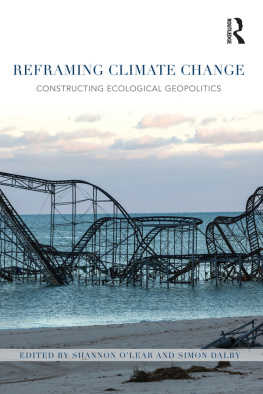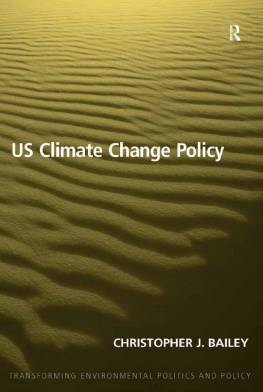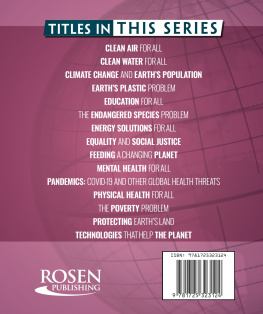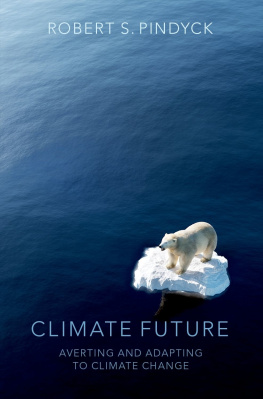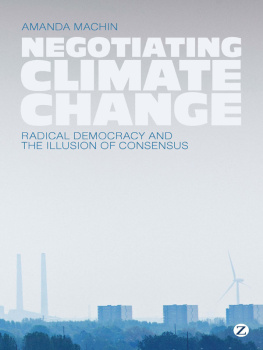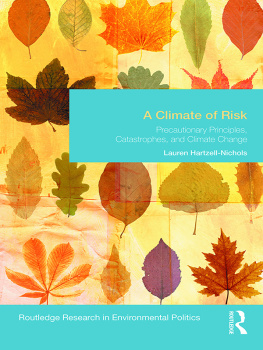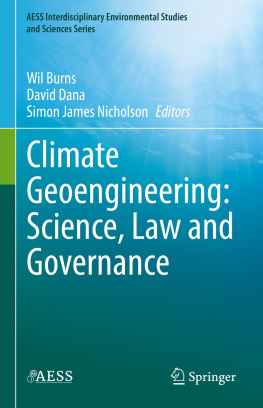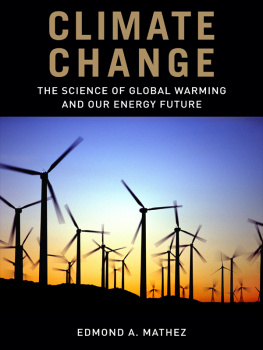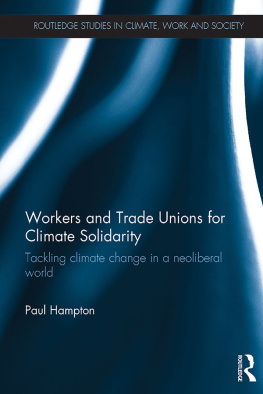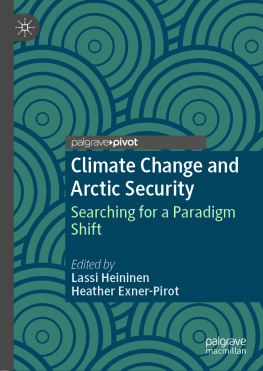Reframing Climate Change
Change the system, not the climate is a common slogan of climate change activists. Yet when this idea comes into the academic and policy realm, it is easy to see how climate change discourse frequently asks the wrong questions. Reframing Climate Change encourages social scientists, policy-makers, and graduate students to critically consider how climate change is framed in scientific, social, and political spheres. It proposes ecological geopolitics as a framework for understanding the extent to which climate change is a meaningful analytical focus, as well as the ways in which it can be detrimental, detracting attention from more productive lines of thought, research, and action.
The volume draws on multiple perspectives and disciplines to cover a broad scope of climate change. Chapter topics range from climate science and security to climate justice and literacy. Although these familiar concepts are widely used by scholars and policy-makers, they are discussed here as frequently problematic when used as lenses through which to study climate change. Beyond merely reviewing current trends within these different approaches to climate change, the collection offers a thoughtful assessment of these approaches with an eye towards an overarching reconsideration of the current understanding of our relationship to climate change.
Reframing Climate Change is an essential resource for students, policy-makers, and anyone interested in understanding more about this important topic. Who decides what the priorities are? Who benefits from these priorities, and what kinds of systems or actions are justified or hindered? The key contribution of the book is the outlining of ecological geopolitics as a different way of understanding humanenvironment relationships including and beyond climate change issues.
Shannon OLear is a Professor at the University of Kansas, USA, where she has a joint appointment in the Departments of Geography and Environmental Studies. She is the author of Environmental Politics: Scale and Power (2010). She has published widely on energy and natural resources, environmental security, and critical geopolitics of the environment.
Simon Dalby is CIGI Chair in the Political Economy of Climate Change at the Balsillie School of International Affairs and Professor of Geography and Environmental Studies at Wilfrid Laurier University, Waterloo, Canada. His previous books include Creating the Second Cold War (1990), Environmental Security (2002), and Security and Environmental Change (2009).
Climate change means different things to different people in different places. It does not have one cause and one solution, but many causes and many solutions. In Reframing Climate Change , OLear and Dalby have brought together an impressive group of political geographers and scientists who undermine the conventional singular narrative of climate change the plan as some have dubbed it before helpfully opening up different ways of framing what is at stake. It is only with such a pluralist account of climate change that the business of politics can get done: to expose, argue over and decide between different visions people have of how the world should be.
Mike Hulme, Professor of Climate and Culture in the Department of Geography, Kings College London, UK
This book is essential reading for those who see or sense that climate change is more than an environmental issue. The authors argue that it is critical to challenge conventional framings of both problems and solutions by bringing in politics, power and new perspectives. Reframing Climate Change unravels some key assumptions that have the potential to transform approaches to security in the Anthropocene.
Karen OBrien, Professor in the Department of Sociology and Human Geography, University of Oslo, Norway
First published 2016
by Routledge
2 Park Square, Milton Park, Abingdon, Oxon OX14 4RN
and by Routledge
711 Third Avenue, New York, NY 10017
Routledge is an imprint of the Taylor & Francis Group, an informa business
2016 Shannon OLear and Simon Dalby
The right of the editors to be identified as the authors of the editorial material, and of the authors for their individual chapters, has been asserted in accordance with sections 77 and 78 of the Copyright, Designs and Patents Act 1988.
All rights reserved. No part of this book may be reprinted or reproduced or utilized in any form or by any electronic, mechanical, or other means, now known or hereafter invented, including photocopying and recording, or in any information storage or retrieval system, without permission in writing from the publishers.
Trademark notice: Product or corporate names may be trademarks or registered trademarks, and are used only for identification and explanation without intent to infringe.
British Library Cataloguing in Publication Data
A catalogue record for this book is available from the British Library
Library of Congress Cataloging in Publication Data
Reframing climate change : constructing ecological geopolitics / edited by
Shannon OLear and Simon Dalby.
pages cm
Includes bibliographical references and index.
1. Climatic changesPolitical aspects. 2. ClimatologyPolitical aspects.
3. Geopolitics. I. OLear, Shannon. II. Dalby, Simon.
QC903.R429 2015
363.73874dc23
2015013423
ISBN: 978-1-138-79436-8 (hbk)
ISBN: 978-1-138-79437-5 (pbk)
ISBN: 978-1-315-75926-5 (ebk)
Typeset in Bembo
by Keystroke, Station Road, Codsall, Wolverhampton
Simon Dalby is CIGI Chair in the Political Economy of Climate Change at the Balsillie School of International Affairs and Professor of Geography and Environmental Studies at Wilfrid Laurier University, Waterloo, Canada. He is the author of Creating the Second Cold War (1990), Environmental Security (2002), and Security and Environmental Change (2009).
Leigh Glover is an academic and researcher. He is a former Director of the Australasian Centre for the Governance and Management of Urban Transport (GAMUT) at the University of Melbourne, Australia. He has authored several chapters, papers, and reports on climate change and the book Postmodern Climate Change (2006).
Kevin Grove is a Lecturer in Human Geography in the Department of Geography and Earth Sciences at Aberystwyth University, UK. His research focuses on the biopolitics of disaster management, and especially on catastrophe insurance and community-based disaster resilience programming in the Caribbean. He has published in geographic and interdisciplinary journals, including Annals of the Association of American Geographers , Security Dialogue , Environment and Planning D: Society and Space , and Resilience .
Emily Meierding is a Visiting Fellow at the Centre for International Environmental Studies at the Graduate Institute of International and Development Studies, Geneva, Switzerland. Her research examines the relationships between traditional energy resources, climate change, and conflict. She has published in the International Studies Review.
Shannon OLear is a Professor in both the Geography Department and Environmental Studies Program at the University of Kansas, USA. She is the author of Environmental Politics: Scale and Power (2010). She has published on energy, resource, and identity issues in the South Caucasus with a focus on Azerbaijan, territorial conflict, genocide, borders, environmental security, and critical geopolitics of the environment.

